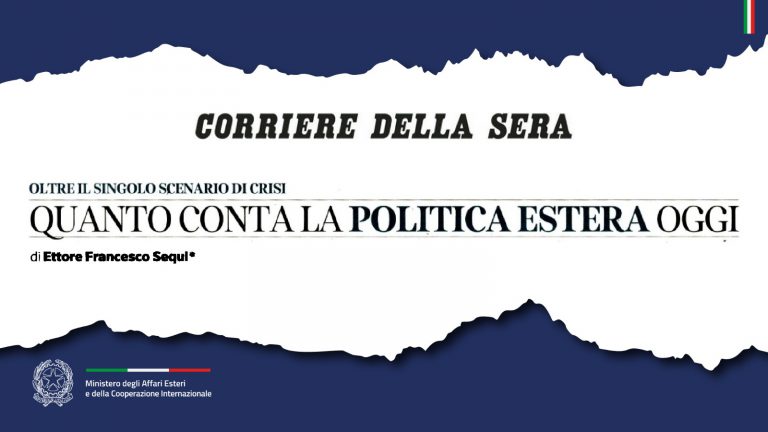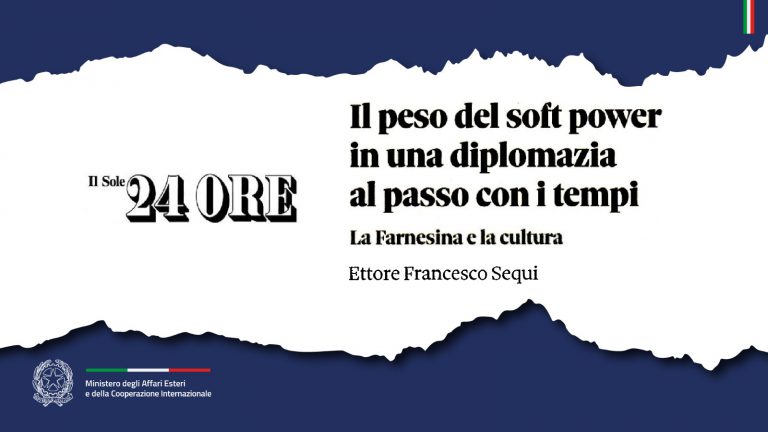Dear Editor,
The weight of foreign policy can also be inferred from our household bills. The fallout of skyrocketing gas and wheat prices on households and enterprises brings back to mind the effects of ongoing Russian-Ukrainian conflict. It is therefore in the logic of things to talk about it so that readers may be enabled to form an opinion on the causes and the possible solutions.
However, a wise foreign policy stretches beyond single crisis scenarios. It must come to terms with different time horizons, and represent the common heritage of the entire Country, on an ever-more complex and competitive international scene.
We are going through an era of great change, or perhaps a change of era. It is as if, two decades late, the limit between two millennia were finally overcome in forging a difference between the awareness of the global challenges to tackle, the pervasiveness of technological breakthroughs, the frail interdependence configured through globalization, the quality and location of resources contended between a growing number of increasingly well-equipped and organised – and sometimes unscrupulous – international players, often unhesitant to wield force.
We should therefore ask ourselves if diplomacy represents the most effective tool whereby to defend national interests. It undoubtedly is. In fact, it is ever more necessary: we need more diplomacy and more of the Farnesina. The centrality of foreign policy and the tangible benefits to the daily lives of each and every one of us lie in the facts.
It is beyond our boundaries that, through Italy’s partnership with its allied Countries and friends, we are able to create the best conditions for assuring our security in the face of old and new threats. It is through multilateral cooperation – especially within the European Union – that we are capable of tackling problems of global dimensions such as pandemics or climate change. It is by supporting and offering guidance to our companies abroad that we manage to grow, even during inflationary periods, economic slumps, and problems in the supply chain.
The Farnesina is not alone in meeting these challenges and actually pursues systematic coordination with other State institutions, maintains a continuous dialogue with the private sector, civil society, and our communities abroad, collecting their points of view and needs.
Some examples and figures can be of assistance in understanding the sense and results of the “Farnesina method”. The new internationalisation competences entrusted to the Foreign Ministry, expressed as participatory in the Pact for Export, achieved an absolute record in exports in 2021 (totalling 516 billion euros). We have undertaken the effort to diversify energy sources and have reduced our dependence on Russian gas from 40% to 25%. Our network of embassies assures continuity where our national interests are at play: from the EU to NATO, from the UN to the Mediterranean, all the way to Africa or the Indo-Pacific. The Farnesina has upgraded its organization to leverage Italy’s soft power through modern public and cultural diplomacy. It has expanded and upgraded consulates with a view to engaging new Italian emigrants. It has modernised the instruments made available to the Crisis Unit to increasingly better protect Italians abroad, also in emergency situations. Our diplomacy acts in the most sensitive scenarios, from Ukraine to Afghanistan and Libya, to assure the safety of Italian citizens, help refugees, evacuate personnel in situations of danger, support enterprises, and stabilize conflicts. It often does so in silence and sometimes at a high price, as we are recalled by the tragedy of Ambassador Luca Attanasio.
In the midst of a war waged on the edges of Europe and only a few days ahead of the elections that 5 million Italians residing abroad will be summoned to vote in through the commitment of our diplomatic and consular network, the Farnesina confirms to be a fully-fledged “public service provider at the service of the Country”. As such, it is a resource to protect, also because it is highly cost-effective.
Indeed, it only accounts for 0.3% of the State budget, downsized to only 0.1% if we deduct the allocations for official development assistance. Yet, according to a recent market survey, every euro invested in our diplomacy generates at least 38 euros in contributions to the GDP.
However, maintaining this level of efficiency requires continuous innovation in competencies, instruments, and working methods in order to keep in pace with the times which unfold faster than ever before.
It is crucial to continue along the road of the preventive strategies that the Farnesina has been pursuing for several years now: first and foremost, provide ever-more effective, accessible and innovative services to citizens, enterprises, and to all our users; put our stakes on the resources needed for a modern public diplomacy capable of communicating simply and accurately, leverage a global influence from our cultural heritage, and be able to interpret reality and plan its activities through state-of-the-art instruments.
If dealing with foreign policy is a necessary option in defending national interests, it becomes ever more compelling to provide it with suitable resources. The facts show that Italy’s diplomacy knows how to put them to good use at the service of the Country.



